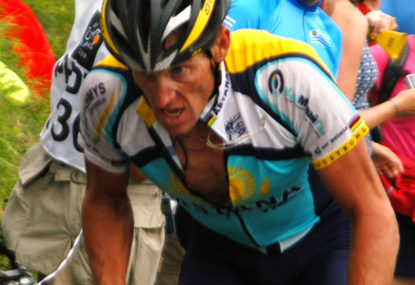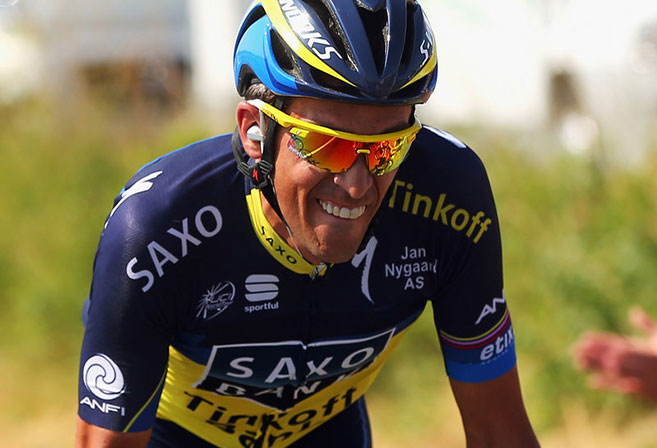'I've just won a stage of the Tour de France, mate!': Hindley grabs yellow jersey as Aussie blows Tour apart
Australia's Jai Hindley has said he is "lost for words" after a shock stage victory at the Tour de France earned him the leader's…

On his seven stripped titles, Lance Armstrong told the BBC: “There’s this huge block: in World War One there’s no winners, in World War Two there’s no winners, and then all of a sudden it almost seems like there’s another world war.
“There has to be a winner…”
Since 1903 the Tour de France has had 101 editions, yet only 94 are regarded as having been won.
Seven Tours have been written off as ‘the Armstrong years’, yet since no rider in the peloton can confidently be called a fair, clean winner, the titles sit vacant.
In 2006 and 2010 two more riders were stripped of their titles. And the three winners who preceded Armstrong as winners in 1996, ’97 and ’98 have all been implicated in doping.
While the perception ‘the Armstrong years’ were dirty is spot on, the name is not. A huge portion of this global sport’s competitors, coaches, doctors and administrators were either implicit in or aware of doping, and for more than just the seven years Lance Armstrong won the Tour.
Check out the rest of World War Cycling
PART 2: World War Cycling: The United States of America
PART 3: World War Cycling: Italy
PART 4: World War Cycling: Doping learnings of America for make benefit glorious nation of Kazakhstan
PART 5: World War Cycling: Spain
PART 6: World War Cycling: Germany and Denmark
For most of cycling’s history doping was legal. It was not until Tom Simpson’s death in 1967 that the sport began to understand that enhanced performance was just one of the side effects of drug use.
Simpson, the leader of the British team at the Tour de France, died while ascending Mt Ventoux, the autopsy finding a deadly combination of alcohol and amphetamines in his system.
Team mechanic Harry Hall was the last man to speak to Simpson, putting him back on his bike after Simpson had already collapsed once during the race. Hall said the doomed man’s final words were, “On, on, on.”
This at-all-costs attitude saw Simpson pay the ultimate price, but it is also exactly what is required to win a Grand Tour. A kind of mad determination, a willingness to take pain, and a refusal to stop when every fibre of your being screams for a reprieve.
Riding for three weeks up some of Europe’s tallest mountains, and battling 180 other fit, determined pros; simply finishing the Tour de France is one of the hardest physical achievements in sport.
But to actually win the thing requires more than just your own borderline insanity, it also takes the efforts of dozens of people.
 Alberto Contador is one man who’s had his ups and downs with doping (Image: Sky)
Alberto Contador is one man who’s had his ups and downs with doping (Image: Sky)
First there are your teammates – eight men whose job is to destroy themselves for the glory of one. While intra-team rivalries are not unheard of, generally these eight domestiques accept their role in the team and do whatever it takes to spur their leader to victory. Whatever it takes.
Then there is the myriad support staff. The team principal or manager, the directeurs sportifs, mechanics, soigneurs, and of course doctors. Each play their role to make life as easy as possible for that one rider whose job it is to snatch glory.
And while it seems absurd to talk about a race of over 3,000 kilometres being a game of inches, the winning margins are in fact extraordinarily narrow.
Vincenzo Nibali, the 2014 Tour champion, beat second-placed Jean Christophe Peraud by 7 minutes and 37 seconds – a gap of 0.1 per cent in overall time. Yet this 0.1 per cent represented an absolute trouncing, the largest margin of victory since Lance’s stripped 1999 result.
This is particularly noteworthy as one of Lance’s drugs of choice was erythropoietin – known as EPO – which can theoretically improve human performance by as much as 15 per cent.
EPO is a naturally occurring hormone which controls red blood cell growth. In the late 1980s pharmaceutical companies successfully synthesised EPO as a means of battling anaemia, and by the early 1990s it had infiltrated the peloton.
In short, explosive sports – such as the football codes or perhaps even a one-day cycling event – EPO has far less impact, as the body has plenty of time to replenish red blood cells.
But over a three-week Grand Tour red blood cells are burned through like matches, with virtually no chance to replenish. EPO increases the body’s ability to create red blood cells, thus improving the flow of oxygen.
However, like any drug, EPO is extremely dangerous if used incorrectly. An overdose sees red blood cells increase to the point the blood all but turns to syrup, and dozens of cyclists died this way. Many others slept with an exercise bike next to their bed, wearing heart-rate monitors – if their heart dropped below a certain level, an alarm would wake them and they would ride to reduce their red blood cells.
Lance won all seven of his Tour victories getting the improvement provided by EPO, as well as human growth hormone, testosterone, cortisone, and blood transfusions. Yet his largest winning margin was just 0.1 per cent faster than his closest rival.
The narrow margins of victory suggest Lance’s refrain since finally admitting to doping is true: everyone was doing it.
Not the smoking gun you’re after? What about retrospective testing results, money trails, and outright admissions from virtually all of Lance’s major competitors?
Since breaking down in tears for Oprah, Lance Armstrong has become the perfect villain. The bullying, the arrogance, the lies – his downfall from saint to demon has been as swift as it was spectacular.
And it has been beneficial for the sport of cycling, because for the larger public it meant no more questions needed to be asked: we got the bad guy.
But Lance wasn’t the first to dope, nor was it a case of him setting the tone and others following in a vain attempt to keep up with his advanced regime. Lance wasn’t the problem, he was merely the face of the problem.
As a result, Lance has been stripped of all his titles while other admitted cheats have been allowed to keep theirs, and even continue as cycling coaches and administrators.
After the way Lance Armstrong treated so many people whose only crime was to speak the truth, it is easy to say he got what he deserved. But forget about goodies and baddies, about denials and lawsuits, about foundations and fortunes.
Over the coming weeks we’ll look at who was taking what, who was prescribing the drugs, and who was looking the other way because there was too much money at stake to blow the whistle.
Fought over many countries, with some of the world’s top scientists, and with a body count unmatched in modern sport, this was a war.
World War Cycling.